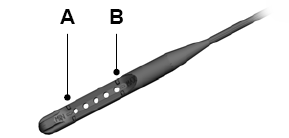Ford Escape: High Voltage Battery Charging System - Plug-In Hybrid Electric Vehicle (PHEV) / Removal and Installation - Charge Port - Plug-In Hybrid Electric Vehicle (PHEV)
Removal
.jpg) WARNING:
To prevent the risk of high-voltage shock, always follow
precisely all warnings and service instructions, including instructions
to depower the system. The high-voltage system utilizes approximately
450 volts DC, provided through high-voltage cables to its components and
modules. The high-voltage cables and wiring are identified by orange
harness tape or orange wire covering. All high-voltage components are
marked with high-voltage warning labels with a high-voltage symbol.
Failure to follow these instructions may result in serious personal
injury or death.
WARNING:
To prevent the risk of high-voltage shock, always follow
precisely all warnings and service instructions, including instructions
to depower the system. The high-voltage system utilizes approximately
450 volts DC, provided through high-voltage cables to its components and
modules. The high-voltage cables and wiring are identified by orange
harness tape or orange wire covering. All high-voltage components are
marked with high-voltage warning labels with a high-voltage symbol.
Failure to follow these instructions may result in serious personal
injury or death.
NOTE: Removal steps in this procedure may contain installation details.
NOTE: The external high voltage battery charger must be disconnected before performing the following steps.
-
Refer to: High Voltage System Health and Safety Precautions - Overview (100-00 General Information, Description and Operation)..jpg) WARNING:
Before beginning any service procedure in this
manual, refer to health and safety warnings in section 100-00 General
Information. Failure to follow this instruction may result in serious
personal injury.
WARNING:
Before beginning any service procedure in this
manual, refer to health and safety warnings in section 100-00 General
Information. Failure to follow this instruction may result in serious
personal injury.
-
De-energize the high voltage system.
Refer to: High Voltage System De-energizing (414-03A High Voltage Battery, Mounting and Cables, General Procedures).
-
Remove the CSI .
Refer to: Charge Status Indicator (CSI) - Plug-In Hybrid Electric Vehicle (PHEV) (414-03B High Voltage Battery Charging System - Plug-In Hybrid Electric Vehicle (PHEV), Removal and Installation).
-
NOTICE: Before disconnecting the high voltage battery electrical connector, the electrical connector must be cleaned with a nylon brush and free of debris. Blow any dirt or debris from the electrical connector with compressed air before disconnecting or component damage may occur.
NOTICE: High voltage electrical connectors may require unique methods to be disconnected. If not properly disconnected, component damage may occur.
-
Clean high voltage battery electrical connector with
a nylon brush. Blow any dirt or debris from the electrical connector
with compressed air.
-
Disconnect the charge port electrical connector.
Refer to: High Voltage Connector Disconnect and Connect (414-03A High Voltage Battery, Mounting and Cables, General Procedures).
-
Remove the bolt, detach the retainers and position the wire harness aside.
Torque: 26 lb.ft (35 Nm)
-
Clean high voltage battery electrical connector with
a nylon brush. Blow any dirt or debris from the electrical connector
with compressed air.
 |
-
Disconnect the electrical connector, detach the retainers, remove the bolts and the charge port.
Torque: 93 lb.in (10.5 Nm)
.jpg) |
Installation
-
To install, reverse the removal procedure.
 General Procedures - Charge Cord Lock Manual Release - Plug-In Hybrid Electric Vehicle (PHEV)
General Procedures - Charge Cord Lock Manual Release - Plug-In Hybrid Electric Vehicle (PHEV)
Activation
NOTE:
Some regions have charging stations that engage a safety
latch, that positively locks the High Voltage charge cord to the vehicle
charge port until the latch is released...
 Removal and Installation - Secondary On-Board Diagnostic Control Module A (SOBDM) - Plug-In Hybrid Electric Vehicle (PHEV)
Removal and Installation - Secondary On-Board Diagnostic Control Module A (SOBDM) - Plug-In Hybrid Electric Vehicle (PHEV)
Special Tool(s) /
General Equipment
Hose Clamp(s)
Removal
WARNING:
To prevent the risk of high-voltage shock, always follow
precisely all warnings and service instructions, including instructions
to depower the system...
Other information:
Ford Escape 2020-2025 Service Manual: Description and Operation - Transmission Cooling - Hybrid Electric Vehicle (HEV) - Overview
Overview The transmission fluid cooling system consists of the following: Transmission fluid cooler tubes Transmission fluid cooler This vehicle is equipped with an external air cooled transmission fluid cooler. Transmission fluid flows from the transmission through the transmission fluid cooler via the transmission fluid cooler tubes...
Ford Escape 2020-2025 Owners Manual: Mobile Communications Equipment
WARNING: Driving while distracted can result in loss of vehicle control, crash and injury. We strongly recommend that you use extreme caution when using any device that may take your focus off the road. Your primary responsibility is the safe operation of your vehicle...
Categories
- Manuals Home
- 4th Generation Ford Escape Owners Manual
- 4th Generation Ford Escape Service Manual
- Description and Operation - Identification Codes
- Plug-In Hybrid Electric Vehicle Drive Modes
- Symbols Glossary
- New on site
- Most important about car
Engine Oil
Engine Oil Dipstick Overview

